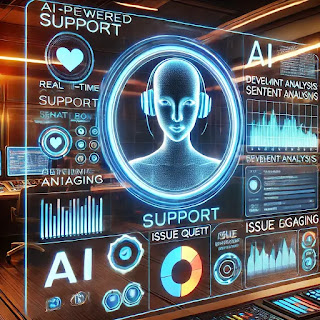AI-Enhanced Developer Support: From Chatbots to Conversational AI
In today’s fast-paced tech environment, developers demand quick, accurate, and consistent support. Traditional support models often struggle to keep up with these expectations, leading to frustration and delayed solutions. However, Artificial Intelligence (AI) is transforming developer support by introducing smarter, faster, and more adaptive solutions. AI-powered tools like chatbots and conversational AI are redefining how organizations engage with developers, ensuring better user experiences and reducing support inefficiencies. Here’s how AI is revolutionizing developer support and why it’s a critical asset for DevRel teams.
🚀 1. Chatbots: Fast and Reliable Initial Support
Chatbots serve as the first point of contact in AI-powered developer support systems. They handle common queries, provide immediate responses, and streamline basic troubleshooting. By automating these routine tasks, chatbots reduce the workload for human support agents and ensure developers get 24/7 assistance.
Key Benefits:
- Instant Query Resolution: Provides fast answers to frequently asked questions.
- Reduced Human Intervention: Automates repetitive tasks efficiently.
- Continuous Availability: Offers round-the-clock support without delays.
- Increased Efficiency: Allows support teams to focus on complex issues.
🤖 2. Conversational AI: Context-Aware and Adaptive
Conversational AI goes beyond basic chatbot functionality by delivering context-aware interactions. It understands the nuances of developer queries, analyzes past interactions, and delivers responses that are more accurate and personalized. Through natural language processing (NLP), conversational AI can assess intent and provide relevant solutions.
Why It’s a Game-Changer:
- Contextual Understanding: Recognizes previous interactions for better responses.
- Adaptive Learning: Enhances accuracy with every query.
- Tailored Solutions: Provides personalized support for complex issues.
- Seamless Escalation: Routes unresolved cases to human agents when needed.
📊 3. Automated Issue Triaging: Smarter Query Routing
AI-powered triaging systems analyze incoming developer queries and categorize them based on complexity and urgency. By directing complex issues to appropriate support channels and automating routine tasks, AI optimizes the support workflow.
Advantages of AI Triaging:
- Accurate Query Categorization: Sorts issues based on complexity.
- Faster Escalation: Routes critical queries to specialized teams.
- Improved Efficiency: Reduces manual query handling.
- Balanced Workload Distribution: Ensures appropriate task assignment.
🔍 4. AI-Powered Self-Service Options
AI-powered self-service platforms empower developers to find solutions independently. These platforms leverage machine learning to recommend relevant documentation, tutorials, and resources based on query patterns and user behavior.
Key Features:
- Intelligent Search Suggestions: Delivers accurate resources based on context.
- Dynamic Content Updates: Keeps documentation aligned with evolving needs.
- Reduced Support Dependency: Minimizes repetitive query handling.
- Enhanced Developer Autonomy: Provides immediate, on-demand solutions.
🎯 5. Personalizing Developer Support with AI
AI analyzes developer interaction data to deliver personalized support experiences. By identifying user preferences and pain points, AI ensures that developers receive solutions tailored to their needs, improving engagement and satisfaction.
How AI Personalizes Support:
- Customized Recommendations: Offers solutions aligned with user profiles.
- Predictive Assistance: Anticipates and addresses potential issues.
- Adaptive Learning Models: Improves responses over time.
- Targeted Communication: Engages developers with relevant content.
🧠 6. AI and Knowledge Base Optimization
AI maintains and updates knowledge bases by analyzing developer inquiries and identifying gaps. It recommends content improvements and ensures that documentation remains relevant and accurate.
Why AI Enhances Knowledge Management:
- Real-Time Content Updates: Keeps information fresh and aligned with needs.
- Improved Search Accuracy: Provides developers with precise results.
- Fills Documentation Gaps: Identifies and resolves content deficiencies.
- Enhanced Usability: Makes knowledge bases more intuitive.
📈 7. Measuring AI Support Performance
AI not only improves support efficiency but also generates insights into performance metrics. Tracking data such as response times, resolution rates, and developer satisfaction enables organizations to refine their support strategies.
Key Metrics to Track:
- Average Resolution Time: Monitors how quickly queries are resolved.
- Satisfaction Ratings: Measures the quality of support provided.
- Issue Escalation Trends: Identifies common points of friction.
- Query Volume Analysis: Highlights recurring support themes.
💡 8. The Future of AI in Developer Support
AI technology is evolving rapidly, paving the way for even more intuitive and proactive support solutions. In the future, AI will predict and address developer needs before issues arise, enhancing the overall support experience.
What Lies Ahead:
- Proactive Issue Prevention: Detects and resolves potential problems.
- Advanced Conversational AI Models: Better understands complex developer intent.
- Automated Content Refinement: Ensures continuous documentation accuracy.
- Deeper Personalization: Creates highly customized support experiences.
🎁 Conclusion: Transform Developer Support with AI
AI-powered solutions are reshaping developer support by delivering faster responses, smarter issue triaging, and personalized experiences. By leveraging chatbots, conversational AI, and self-service options, organizations can optimize support workflows and ensure higher developer satisfaction.
Ready to revolutionize your developer support with AI?
Discover how Doc-E.ai can enhance your DevRel strategy today!


.jpg)
Comments
Post a Comment